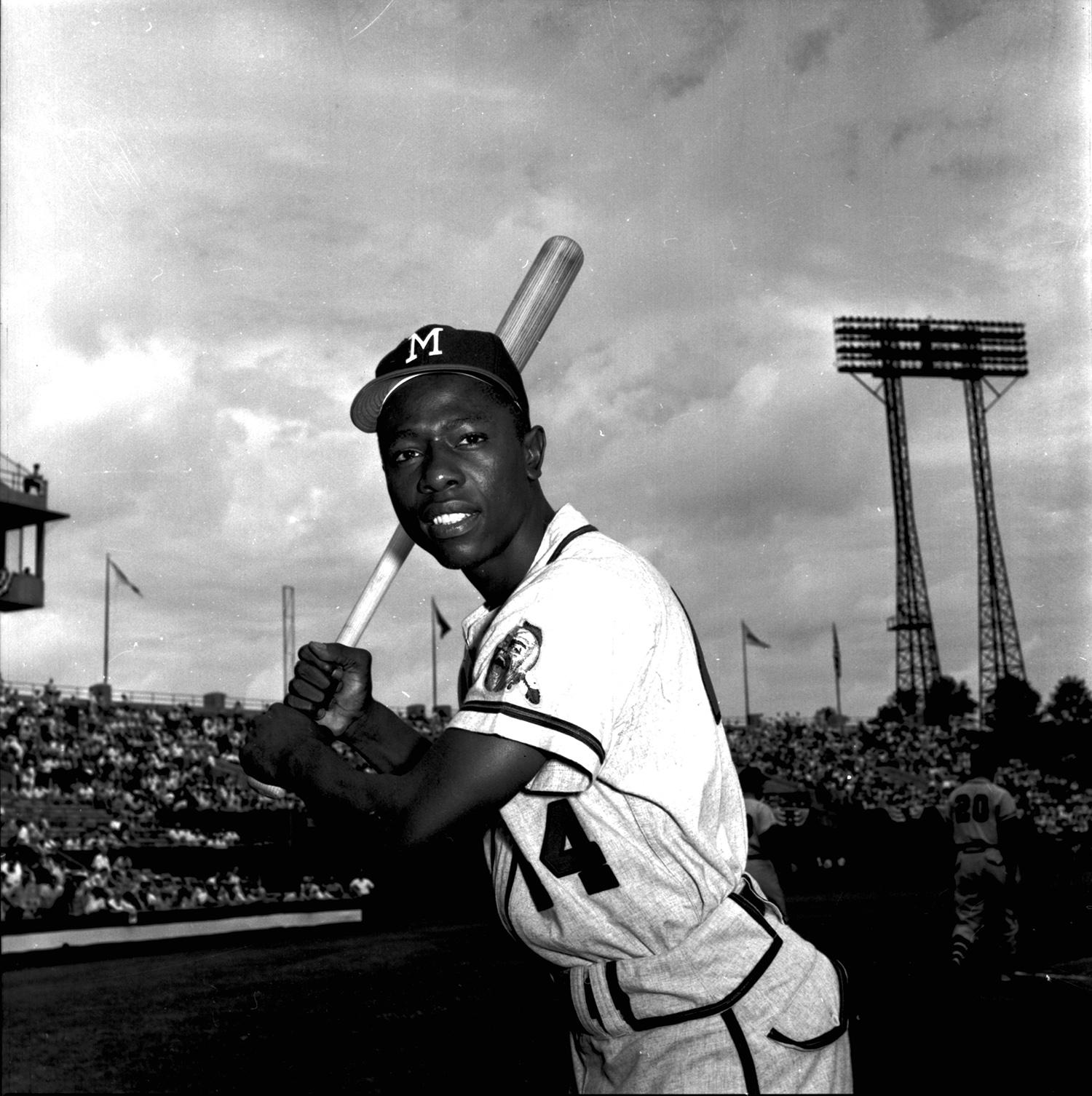
Seems to me that Billy Bruton played next to him in centerfield, so he wasn't the only African-American on the roster. But he was early. Those old pics of that 1957 team--World Champ Milwaukee Braves!--have four or five others.
All I know was that when I was a kid, on many a night I fell asleep with the Braves game still playing on that little radio up above my bed, it's soft yellow light over the dial. I loved going to sleep with the Braves, loved it so much that there were nights when I didn't even nod off.
Coming into the ninth, the Braves may have trailed, but if the heart of the lineup was on its way to the plate, there was always a chance. Hank Aaron was there, batting in the third position, followed by Eddie Matthews, the third basemen, at cleanup. Those two guys could hit. And did. That's what I remember thinking about Hammerin' Henry Aaron--the guy could hit.
Really, he was a little guy. Muscle-y? --sure. But Aaron had great wrists, my dad used to say, great wrists that snapped that bat with so much torque the stadium walls came tumbling down.
The biggest story of his professional life was how he finally outdid the Babe and ended his career with 755 round-trippers. That was two decades later, in 1976, the year of the American Bicentennial, the year our daughter came into the world. By that time I was well aware of his being African-American, as was the nation, because hate mail and death threats arrived daily as he climbed ever closer to the Babe's otherwise untouchable record. All that hate on the U.S. of A’s 200th birthday was obscene.
"You are not going to break this record established by the great Babe Ruth if I can help it," some guy told him in a letter. "Whites are far more superior than..." well, you put the word in. "My gun is watching your every black move."
Today, generations of kids can't imagine someone capable of such wicked hate, but it was in the air in 1976. The man who wrote those lines wasn't alone. Henry Aaron, an African-American, was threatening a great man's home-run record. A great man who was White.
Long before email or messaging, the Postal Service that year brought him nearly a million letters. Thousand and thousands in that massive bagfull were greatly supportive and loving. But America's finest racists couldn't go down without threatening a noose from the old days.
But they couldn't stop him. Hammerin' Hank still owns a shoebox full of major league records: most career runs batted in at 2,297, total bases at 6,856, and extra base hits at 1477. And there's more. There's lots more.
But I thought of him not long ago--I couldn't help it, really--when I saw his name on a stone carved into the sidewalk beneath me.
His footprints sit at the International Civil Rights Walk of Fame at the Martin Luther King National Monument in Atlanta. And he's in good company too--Thurgood Marshall, Ralph Abernathy, Edward Brooke, Rosa Parks, Jimmy Carter, and more than a dozen others. Something tells me, Hammerin' Hank is likely as proud of being there as he is in Cooperstown.
Breaking that record wasn't easy, not at his age. He played in 3300 ball games, third place all-time; but it wasn't easy to live as he did, in the eye of a racial storm that will likely never fully pass off the coast and out to sea.
On that day in Atlanta when he hit number 715, one more than the Babe, that day when some people were scared of what could happen, the image I like best is that when Henry Aaron came around third, there at the plate stood his parents. Isn't that just the greatest?
It was nice seeing him again there at the King Monument. I'm thankful for that sidewalk, for those footprints of his, and the tracks he left in my life. And yours.
Next time you’re in Atlanta, walk in ‘em. Try.

Thanks for this post. What a great way to remember Martin Luther King Day! While I regret our nation's racist past, in some way the blog gave me hope. I love baseball. I'm looking forward to spring and the beginning of a new baseball season. With each new season, comes hope. I hope our country will become a better place for all races and ethnicities.
ReplyDeleteUp slid the window, I was playing catch with Eddie Bloomers, when his Dad [Les]shouted out, "Hank Aaron hit a home run!" None of us gave a snap whether his skin color was black, green, or white. We never thought about it and did not care. We were all rooting for the same team.
ReplyDeletePrejudice is wrong where ever it raises it's ugly head .... I.Q, disability, sex, nationality and race can be distancers. Baiting using these distancers goes beyond the pale.